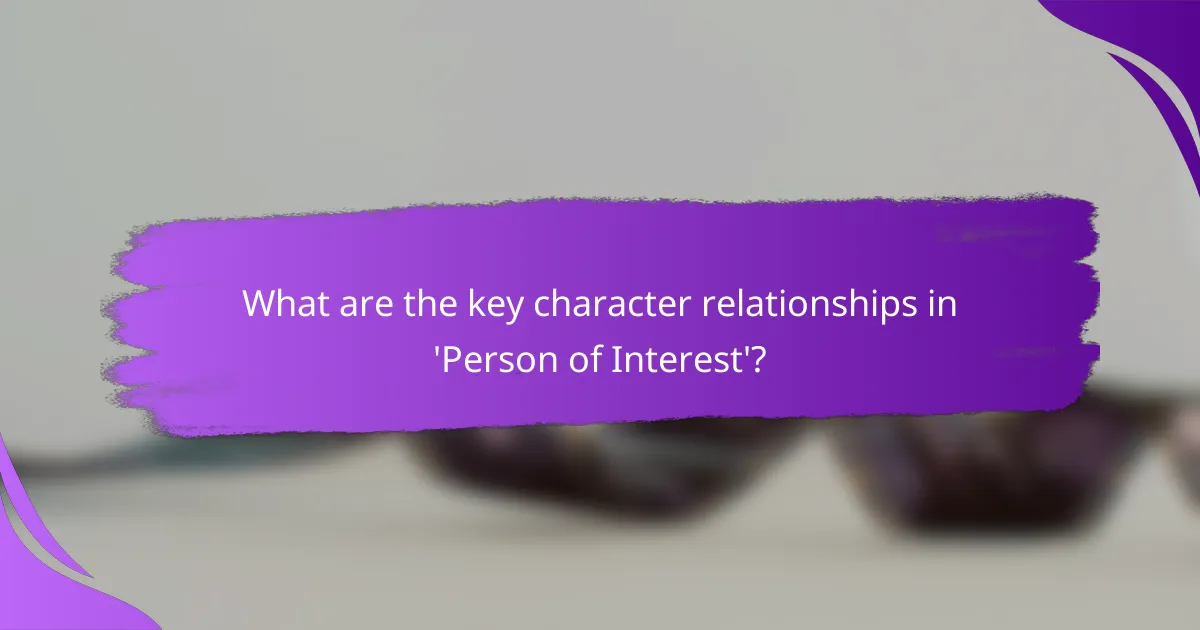The article examines the character relationships and their development in the television series ‘Person of Interest,’ focusing on key entities such as John Reese, Harold Finch, detective Joss Carter, Sameen Shaw, and Root. It highlights the foundational themes of trust, betrayal, loyalty, and redemption, illustrating how these dynamics shape interactions among the characters. The narrative delves into the complexities of their alliances and conflicts, showcasing how betrayal arises from differing motivations and ethical dilemmas. Through pivotal moments, the article emphasizes the fragility of trust and the pursuit of redemption, providing a comprehensive overview of the intricate character relationships that drive the story forward.

What are the key character relationships in ‘Person of Interest’?
The key character relationships in ‘Person of Interest’ center around John Reese, Harold Finch, and detective Joss Carter. John Reese and Harold Finch share a partnership built on trust and a mutual goal of preventing violent crimes. Finch, the creator of the Machine, relies on Reese’s combat skills to execute their plans. Detective Joss Carter forms a critical alliance with Reese and Finch, acting as a bridge between them and the police.
Another significant relationship is between Reese and Sameen Shaw. Their bond develops from mutual respect as they work together on missions. Root, a hacker, also has a complex relationship with Finch, oscillating between ally and adversary. These relationships evolve throughout the series, showcasing themes of loyalty, betrayal, and moral ambiguity.
How do these relationships evolve throughout the series?
The relationships in ‘Person of Interest’ evolve through trust, betrayal, and character growth. Initially, characters like Finch and Reese share a cautious partnership. As the series progresses, their bond deepens, showcasing loyalty and mutual reliance. Conflicts arise, particularly with characters like Root and Shaw, challenging existing alliances. Betrayals test these relationships, leading to significant character development. For example, Reese’s past influences his trust in others, while Finch’s secrets create tension. Ultimately, the evolution reflects complex dynamics shaped by circumstances and personal choices throughout the series.
What initial dynamics are established between main characters?
The initial dynamics established between main characters in ‘Person of Interest’ revolve around trust and suspicion. Harold Finch, a reclusive billionaire, initially keeps secrets from John Reese, a former CIA operative. Finch hires Reese to prevent violent crimes using a predictive algorithm. Reese’s skepticism about Finch’s motives creates tension. As they work together, a bond forms based on mutual reliance. However, their differing views on morality and justice introduce conflict. The dynamic evolves as they confront external threats, testing their trust. This complexity deepens their relationship throughout the series.
How do external events impact character relationships?
External events significantly impact character relationships by creating challenges and opportunities for growth. In ‘Person of Interest’, events such as crises, threats, or revelations alter dynamics between characters. For example, a shared traumatic experience can strengthen bonds, while betrayal can lead to mistrust. Research indicates that external stressors often reveal true character traits, influencing interpersonal connections. In narrative contexts, these events serve as catalysts for character development and relationship evolution.
What role does trust play in character relationships?
Trust serves as a foundational element in character relationships. It influences interactions and shapes emotional bonds. In ‘Person of Interest’, trust is pivotal for collaboration among characters. Characters often rely on trust to share vital information. Betrayals in the series highlight the fragility of trust. When trust is broken, relationships deteriorate significantly. The consequences of mistrust lead to conflict and tension. Trust, therefore, is essential for character development and plot progression.
How is trust built among the characters?
Trust among the characters is built through consistent actions and shared experiences. Characters demonstrate reliability by following through on promises. They engage in open communication, which fosters transparency. Mutual support during critical moments strengthens their bonds. Vulnerability shared among characters also facilitates deeper connections. Trust is often tested and reinforced through overcoming challenges together. These dynamics create a foundation for trust that evolves throughout the narrative.
What moments signify a breach of trust?
Breach of trust occurs when an individual acts contrary to the expectations of honesty and reliability. Key moments include revealing confidential information without consent. Another significant moment is failing to follow through on promises made. Actions that undermine someone’s confidence, such as lying or manipulation, also signify a breach. In ‘Person of Interest’, characters experience these moments in various relationships. For example, when a character betrays another’s secret, trust is irrevocably damaged. These actions lead to emotional fallout and conflict. Trust is foundational in relationships, and its violation has lasting consequences.

How is betrayal portrayed in ‘Person of Interest’?
Betrayal in ‘Person of Interest’ is portrayed through complex character dynamics and moral dilemmas. Characters often face choices that test their loyalties. For instance, John Reese experiences betrayal from former allies and the consequences of his past actions. Harold Finch grapples with the ethical implications of using the Machine. The show illustrates how betrayal can stem from differing motivations and secrets. Characters like Root and Shaw also navigate betrayal in their relationships. These portrayals highlight the fragility of trust in high-stakes situations. The narrative emphasizes that betrayal can lead to unexpected alliances and personal growth. Overall, ‘Person of Interest’ uses betrayal to explore deeper themes of loyalty and redemption.
What are the motivations behind acts of betrayal?
Acts of betrayal are often motivated by personal gain, fear, or unresolved conflicts. Individuals may betray others to achieve power, financial benefits, or social status. Fear can drive betrayal, especially in situations where one feels threatened or insecure. Unresolved conflicts or grievances may lead individuals to act against someone they once trusted. Emotional factors, such as jealousy or anger, can also play significant roles in motivating betrayal. Studies show that betrayal frequently occurs in competitive environments, where individuals prioritize self-interest over loyalty. In ‘Person of Interest’, characters demonstrate these motivations through their complex relationships and decisions, highlighting the multifaceted nature of betrayal.
How do personal histories influence betrayal among characters?
Personal histories significantly influence betrayal among characters by shaping their motivations and vulnerabilities. Characters with traumatic pasts may betray others to protect themselves or gain power. For instance, a character who experienced abandonment might betray a close ally out of fear of being left again. This betrayal can stem from deep-seated insecurities linked to their history.
Additionally, personal histories can create conflicting loyalties. A character may feel torn between a past relationship and a current obligation. This internal conflict often leads to decisions that appear treacherous to others. In ‘Person of Interest’, characters like Root and Shaw showcase how their past experiences drive their actions and betrayals. Their histories inform their relationships, making betrayal a complex interplay of trust and personal survival. Thus, personal histories serve as a foundational element in understanding character motivations and betrayals.
What are the consequences of betrayal on character dynamics?
Betrayal significantly alters character dynamics by eroding trust and creating conflict. Trust is foundational in character relationships, and its breach leads to emotional distance. Characters may become suspicious or hostile towards one another. This shift can result in fractured alliances and altered motivations. For instance, in “Person of Interest,” betrayal impacts team cohesion and individual arcs. Characters often face moral dilemmas after betrayal, affecting decision-making and relationships. Ultimately, betrayal leads to a re-evaluation of loyalties and can trigger transformative character development.
How do characters respond to betrayal?
Characters respond to betrayal with a range of emotional and behavioral reactions. Common responses include anger, sadness, and a desire for revenge. Some characters may withdraw from relationships or become distrustful of others. Others might confront the betrayer directly, seeking answers or closure. In ‘Person of Interest’, characters like John Reese exhibit deep emotional pain and struggle with their sense of morality after betrayal. For instance, Reese often grapples with feelings of isolation and guilt. This complexity highlights the impact of betrayal on personal identity and relationships. The narrative illustrates how betrayal can lead to significant character development and transformation.
What coping mechanisms do characters employ?
Characters in ‘Person of Interest’ employ various coping mechanisms to deal with stress and conflict. These mechanisms include avoidance, where characters retreat from challenging situations. They also utilize humor to lighten tense moments, helping to relieve anxiety. Some characters engage in problem-solving, actively seeking solutions to their dilemmas. Others resort to aggression, expressing frustration through confrontations. Emotional suppression is another tactic, where characters hide their feelings to maintain composure. Social support is frequently sought, as characters rely on one another for comfort and understanding. Additionally, introspection plays a role, with characters reflecting on their choices and consequences. These coping strategies illustrate the complexity of their relationships and personal growth throughout the series.
How does betrayal affect their future relationships?
Betrayal significantly impacts future relationships by eroding trust. Individuals who experience betrayal often develop trust issues. They may struggle to open up to new partners. This can lead to emotional distance and fear of vulnerability. Research indicates that betrayal can create lasting psychological scars. A study by K. K. Dijkstra and A. M. Barelds shows that betrayal leads to increased anxiety in future relationships. Consequently, individuals may sabotage potential connections. They might also engage in self-protective behaviors to avoid further pain. Overall, betrayal creates a cycle of distrust that complicates future intimacy.

What themes are explored through character relationships?
Character relationships in ‘Person of Interest’ explore themes of trust, betrayal, loyalty, and redemption. Trust is a foundational element that shapes interactions between characters. Betrayal often emerges from conflicts and differing motivations. Loyalty is tested through various challenges faced by the characters. Redemption is sought by characters who have made mistakes, leading to personal growth. These themes are illustrated through pivotal moments in the narrative. For example, the character of John Reese grapples with his past decisions, highlighting the theme of redemption. The dynamic between Harold Finch and Reese showcases the complexities of trust and loyalty. Overall, these themes are intricately woven into the character relationships throughout the series.
How do trust and betrayal reflect broader societal issues?
Trust and betrayal are reflections of broader societal issues such as power dynamics and social cohesion. Trust is foundational for healthy relationships and communities. When trust is broken, it leads to societal fragmentation. Betrayal can expose systemic inequalities and injustices. For example, political scandals often reveal a betrayal of public trust. This can result in social unrest and disillusionment. Research shows that societies with high levels of trust tend to be more stable and prosperous. Conversely, betrayal can lead to a breakdown in social contracts, impacting community resilience. Thus, trust and betrayal serve as lenses through which we can examine societal health and integrity.
What parallels can be drawn between character interactions and real-life relationships?
Character interactions in narratives mirror real-life relationships through shared emotional dynamics. Both involve trust, conflict, and resolution. In ‘Person of Interest,’ characters exhibit loyalty and betrayal, reflecting human experiences. For instance, the bond between Harold Finch and John Reese illustrates deep trust akin to real friendships. Conflicts arise in both settings, prompting growth and understanding. Research shows that narratives can influence empathy and social perception, reinforcing these parallels. Characters’ struggles and resolutions resonate with viewers, highlighting common relational themes.
How does the series use these themes to comment on technology and surveillance?
The series “Person of Interest” uses themes of trust and betrayal to comment on technology and surveillance. It illustrates how advanced surveillance systems can undermine personal relationships. Characters often grapple with the ethical implications of using technology for surveillance. The show depicts technology as a double-edged sword, offering safety while also invading privacy. For example, the Machine’s ability to predict threats raises questions about free will. Characters like Finch and Reese demonstrate trust in technology, yet face betrayal from those who misuse it. The narrative emphasizes the fragility of trust in a world dominated by surveillance. Ultimately, the series critiques how technology can distort human connections and moral boundaries.
What lessons can be learned from character relationships in ‘Person of Interest’?
Character relationships in ‘Person of Interest’ illustrate the importance of trust and loyalty. The bond between Harold Finch and John Reese shows how mutual respect can drive collaboration. Their partnership emphasizes that trust is foundational in high-stakes situations. Additionally, the relationship dynamics reveal the consequences of betrayal. For instance, characters like Sameen Shaw demonstrate that loyalty can be tested under pressure. The series also highlights the impact of personal sacrifice on relationships. Characters often face moral dilemmas that affect their connections. Overall, ‘Person of Interest’ teaches that relationships are complex and shaped by choices.
How can viewers apply these lessons to their own lives?
Viewers can apply lessons from character relationships in ‘Person of Interest’ by recognizing the importance of trust. Trust is foundational in building strong connections. Viewers can evaluate their own relationships and identify areas where trust can be strengthened. They can also learn to communicate openly to prevent misunderstandings. Observing the consequences of betrayal in the series highlights the need for accountability in relationships. This awareness can encourage viewers to take responsibility for their actions. By reflecting on these dynamics, viewers can foster healthier interactions in their lives. Such practices lead to more meaningful and resilient relationships.
What insights do these character dynamics provide about human nature?
Character dynamics in ‘Person of Interest’ reveal profound insights about human nature. They illustrate the complexities of trust, loyalty, and betrayal. Characters often face moral dilemmas that reflect real-life ethical struggles. The interactions highlight how personal experiences shape one’s decisions and relationships. Trust is shown to be fragile and easily broken, mirroring human relationships in reality. Betrayal leads to significant consequences, affecting not only individuals but entire communities. These dynamics emphasize the duality of human nature, where altruism and self-interest coexist. Ultimately, the narrative underscores that human connections are deeply influenced by past experiences and individual motivations.
The main entity of this article is the character relationships in the television series ‘Person of Interest,’ focusing on trust and betrayal. The article examines key relationships among characters such as John Reese, Harold Finch, Joss Carter, Sameen Shaw, and Root, highlighting their development through themes of loyalty, conflict, and moral complexity. It explores how external events impact these dynamics, the role of trust in collaboration, and the consequences of betrayal on character interactions. Additionally, the article discusses how personal histories influence motivations behind betrayal and the broader societal implications reflected in these relationships. Overall, it provides insights into human nature and the lessons viewers can apply to their own lives.